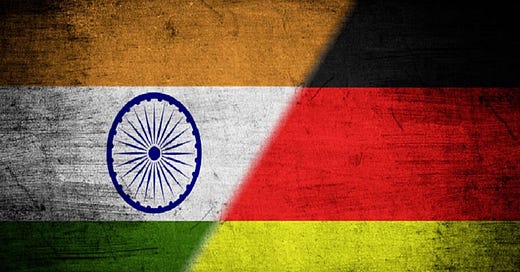India Just Proved That Its Foreign Policy Is Much More Democratic Than Germany’s
While no country’s national model of democracy is perfect, it’s indisputably the case that India’s foreign policy is much more democratic than Germany’s because the former explicitly responds to its people’s economic needs while the latter explicitly goes against them.
Germany is often considered to be one of the leading examples of democracy, yet India just proved that its foreign policy is much more democratic than that Western European country’s. German Foreign Minister Annalena Baerbock blatantly discredited the entire basis of Western Democracy in late August after publicly insisting that she’ll cling to her government’s economically counterproductive anti-Russian sanctions despite predicting that they’ll provoke massive unrest due to spiking energy prices. Indian Petroleum Hardeep Singh Puri, by contrast, just insisted that his government will continue purchasing discounted oil from Russia precisely to preempt any price spikes that could harm his people’s interests.
These optics might be surprising for casual news consumers from the West who’ve been brainwashed by the US-led Mainstream Media (MSM) into wrongly believing that the Golden Billion within which they live has the most democratic system ever created by humanity. The truth, however, is that this declining unipolar civilization is rapidly descending into despotism as its elite openly defy their people’s will out of desperation to advance their own class’ self-interests at their subjects’ expense. In the context of the anti-Russian sanctions, these figures must remain loyal to their American patron who’s responsible for their rise to power. Going against it could carry serious consequences, which few want to risk.
India’s situation is altogether different in more ways than one. First, its leaders rise to power through elections that aren’t influenced by the US-led MSM like the West’s are. Second, this means that they’re under no obligation to sacrifice their objective national interests for that country’s sake. Third, its policymakers therefore prioritize advancing the aforementioned interests. Fourth, this takes the form in the examined context of defying that declining hegemon’s pressure to sanction Russia. And fifth, continuing to purchase its discounted oil in turn helps them manage inflation at home and thus ensure comparatively more stable living standards for their approximately 1.4 billion people.
While no country’s national model of democracy is perfect, it’s indisputably the case that India’s foreign policy is much more democratic than Germany’s because the former explicitly responds to its people’s economic needs while the latter explicitly goes against them. This observation aligns with the global systemic transition to multipolarity whereby the center of gravity in the world is gradually shifting from the US-led West’s Golden Billion to the BRICS-led Global South of which India’s a part. Ironically, while most Westerners still wrongly consider themselves democratic and Asians despotic, a growing number of them are now realizing in horror that the inverse is actually the case.




